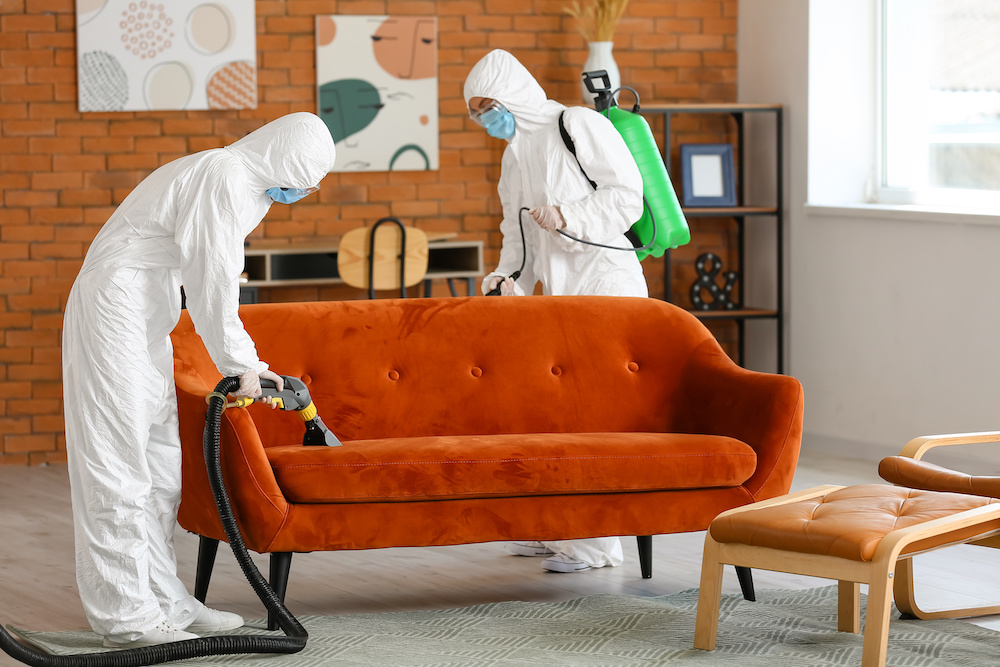

PuroClean restoration professionals are licensed, insured, and certified to remediate biohazard environments safely and in accordance with all applicable laws and standards. We understand that some events may be sensitive and must be handled with compassion and discretion. We bring a sense of calm back to those impacted, whether the loss is in a home, commercial property or business office.

To begin, we provide a full assessment of the incident and affected area(s). We want to make sure that we have a clear understanding of the situation, including the extent of the damage and the areas that have been affected by the biohazardous material. Armed with this information, we can determine the level of containment that is needed and create an action plan to address the situation.
When it comes to performing biohazard removal, safety should always be a top priority. Our team of trained technicians takes special precautions to make sure they and everyone around them stay safe. From wearing personal protective equipment to containing the area, we make it a point to follow industry and OSHA regulations to the letter. But what sets us apart is our commitment to your safety. We take all the necessary steps to ensure that you and your loved ones or employees stay out of harm’s way.
Hazardous medical waste, such as spinal fluid, peritoneal fluid, amniotic fluid, and other bodily fluids, is handled following OSHA regulations. It’s then sent to a licensed hazardous medical waste incinerator.
All affected porous material will be removed in accordance with industry standards and state regulations. Any other infectious material will also be safely discarded. For non-porous surfaces, a thorough process is taken. First, the affected area is dried before applying a disinfectant and allowing it to soak. Once this has taken effect, we take the extra step of scrubbing and repeating the process to ensure a fully disinfected space.
Typically, odors dissipate once the biohazard is cleaned and the area sanitized. However, our crew will determine whether further deodorization is necessary. If so, we use hydroxyls or ozone to eliminate the odor.
With PuroClean’s RapidDefense™, you can be assured of the utmost cleanliness and protection from MRSA, Influenza, or Norovirus contamination. This innovative cleaning system is designed to eliminate any trace of these harmful pathogens, creating a safe and secure environment for you and your loved ones.
Professionals have the equipment and training to clean up biohazards without further contamination safely. This will reduce the likelihood of illness spreading to others at the home or office. Call PuroClean of Southern Indiana at (812) 951-1300 and rest assured that your property is in good hands.
Biohazards are any biological contaminants that risk carrying diseases, such as those found in sewage, mold, or viral or bacterial contamination, such as MRSA. Biohazards also include toxins found in decaying organisms, as well as bodily fluids.
Many insurance policies cover biohazard and crime scene cleanup. Check with your insurance provider to confirm the details of your specific policy.
The Center for Disease Control and Prevention (CDC) requests that we all do our part to slow the spread of the coronavirus. We can do this by avoiding close contact [...]
As of March 17, 2020, the Centers for Disease Control (CDC) does not have information specifically regarding how pregnant women are reacting to COVID-19 exposure. However, it should be noted [...]
Insurance policies have many variables, while Crime Scene or Biohazard cleanup is often covered, you must consult your insurance broker or agent to determine your specific coverages. [...]
As with any virus, the Coronavirus spreads when an infected person coughs or sneezes, and any respiratory droplets come in contact with another person. Keeping a good distance from infected [...]
When a biohazard occurs, professionals are needed to clean and disinfect as improper treatment can spread contamination and lead to illness or life-threatening conditions. [...]